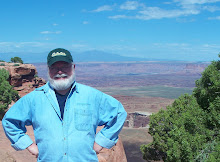President Obama and his administration spokespeople -- VP
Biden, Gibbs, etc. -- are prone (or instructed) to quote a "Jobs Saved" metric to prove that the stimulus worked. Although the Administration cannot cite the same statistic or number on the matter -- someplace between 1 and 3 million jobs saved by the Administration -- there is no statistical category that proves the number; his assertion cannot be proved.
Please, if there is any economist out there reading this -- can you enlighten me about the statistical category "Jobs Saved," because I can't find it among the minutiae of reporting categories. You would think that some category as important as "Jobs Saved" would be in
Bold or CAPS or
PURPLE. But, I can't find it. HELP! ME!!As to the Obama Stimulus package saving the USA from another Great Depression, the President claimed yesterday:
"Our work is far from over, but we have rescued this economy from the worst of this crisis," he said, which the Reuters News Service, an apologist for the Obama Administration, characterised his statement as meaning that
Obama's Stimulus package averted another Great Depression.
Let's be clear. The Great Depression was caused by a Banking Crisis, brought about by a Stock Market crash and intensified by a protracted Drought in the breadbasket of the US. Unemployment was high at nearly 25%, the circulation of money slowed to a drip and no purchasing power was available.
If anything averted the second Great Depression in our time, it was the TARP funds, created by President Bush aimed at recapitalizing the banking industry. What Obama has done -- demonized Bankers, Wall Street firms, and the
CEO's of Industry -- looks like encouraging another Depression, rather than discouraging one.
Of the Stimulus funds -- $800 Billion Dollars -- only $242 Billion has been spent in a year, most of that by giving funds to distressed states like Pennsylvania, New Jersey, Michigan and
Caleefornia, as the
Governator would say. Those Governors, like our Ed
Rendell, will assert that Teachers and
Policemen's jobs were saved, because they did not have to be laid off.
Uhhh, excuse me Ed. Why not lay off government bureaucrats first and Teachers, Policemen and Firemen last -- INSTEAD OF FIRST. Have you abandoned your rationality in order to play politics with jobs? Can I hear an "AMEN?"
PREDICTION: As 2010 election time nears, the remaining $500 billion of the Obama Stimulus Fund will suddenly find a fast lane and get placed in states where democrat politicians are in trouble -- Nevada, Arkansas, Indiana, Senator Boxer's district in Caleefornia.So, what priority will President Obama have demonstrated to us then? That he cares about the American people and those out of work, or that he cares more about getting Harry Reid re-elected? It's our money, Dear Reader; it's our people out of work. If you were in the Oval Office, what would you do?
So, President Obama credits his Stimulus Package from keeping America sinking into the next Great Depression. But... what does America think about the success of his Stimulus Package? Here's a recent poll by the New York Times and CBS News
STIMULUS PACKAGE AND JOBS
Has created jobs 6%
Has not, but will create jobs 41%
Will not create jobs 48 %CBS NEWS/NEW YORK TIMES POLL
Thursday, February 11th, 2010






















